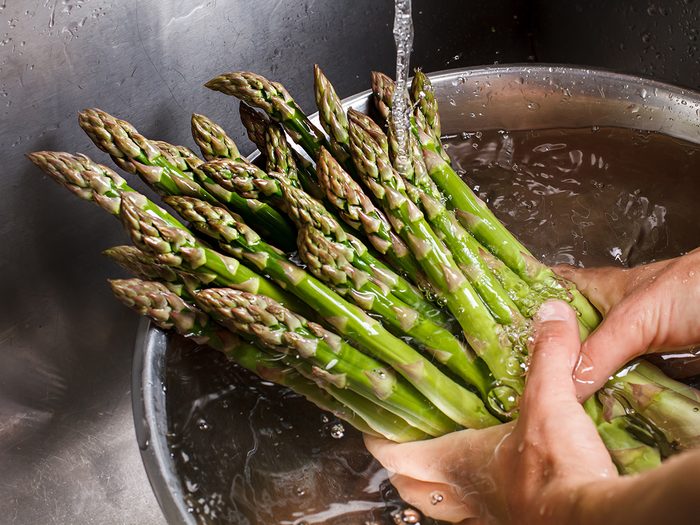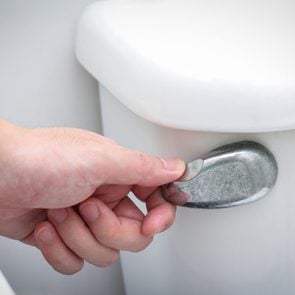Why Does Asparagus Make Your Pee Smell?

We sniffed out the answer to this malodorous mystery.
Asparagus season brings many joys—whether sautéed, grilled, steamed or fresh, these succulent shoots are not only delicious, but one of the most nutritionally-balanced vegetables. Loaded with antioxidants and folate, asparagus also contains brain-boosting amino acids and even cancer-fighting compounds. There’s just one catch—it may give your pee an unholy stench.
This puzzling phenomenon has its basis in asparagusic acid, a unique chemical produced only by (you guessed it) asparagus. Your liver metabolizes it into sulfur-containing compounds that make their way through your kidneys to your bladder and out into the toilet bowl, thus infusing your pee with that characteristic rotten-egg bouquet. Our digestive and excretory systems are so efficient that it can take as little as 15 minutes for the smell to show up.
But scientists have discovered that not everyone is affected by asparagus pee in the same way, deepening a genetic mystery. In fact, as many as 6 in 10 people do not notice any change in their urine’s smell after eating asparagus, and the reason is intriguingly complex.
Why does asparagus make pee smell for some, but not others?
While asparagus’ pungent side-effect has been written about for hundreds of years—even Benjamin Franklin noted its “disagreeable odour” in 1781—earnest scientific inquiry into asparagus pee didn’t begin in until the 1950s, when Oxford University researchers found that 40 percent of their subjects excreted methanethiol (or methyl mercaptan), the infamous stink compound that also causes bad breath, after eating asparagus. Some didn’t produce any at all after eating as much as a pound in a sitting (lucky them).

Not everyone can smell asparagus pee
But in 2016, Harvard University scientists complicated the question with a study on “asparagus anosmia,” or the inability to smell asparagus metabolites in urine. In other words, the main variable is your nose, not what’s in your pee—and according to their research, 60 percent of the population can’t smell the distinctive tang, either in their own pee or that of a “known producer” (we hope participants in this study were well-compensated).
As many as 800 genes are thought to influence whether our smell receptors can pick up the specific compounds that produce the telltale stink. Based on a user survey, consumer genetic testing company 23andMe isolated a single mutation for smelling asparagus pee, which might be inherited (and could help you decide if you should serve asparagus quiche at your next family brunch).
So if you eat asparagus and don’t notice a change in the way your pee smells, can it still stink? Maybe. Some scientists say people vary in their ability to both produce asparagus pee and their ability to smell it. In other words, we can be stinkers, sniffers, both, or neither.
Broader implications
No matter which tribe you belong to, you might be curious what all this can tell us about the differences in the way our bodies work, and what that might mean for our health. If certain foods can make your pee smell, could they also influence your risk for inflammation or cancer? One emerging field of study, nutrigenomics, is based on the relationship between food and our genome, and companies have sprung up offering personalized testing to find out which foods you should eat to optimize your health according to your unique genetic profile.
Toronto-based Nutrigenomix, for example, offers testing for a variety of genes, from your heart disease risk to your propensity for weight gain, and provides customized nutrition advice based on the results. The problem is, some skeptics say, there’s no guarantee that it will work.
“Your risk of heart disease can be altered by multiple gene variants,” says Montreal cardiologist Dr. Christopher Labos. “The claim that you can determine your risk from one test is very, very dubious.”
What’s more, whatever your results, your dietary recommendations will probably be the same, says Labos. “If we all ate more fruits and vegetables, less processed food and more whole grains, we’d all be a lot healthier,” he says. “We don’t need genetic testing to tell us that.”
One thing’s for sure—stinky pee or no, if you’re eating lots of asparagus, you’re doing something right.
Now that you know why asparagus makes your pee smell, find out the surprising things your poop can reveal about your health.






